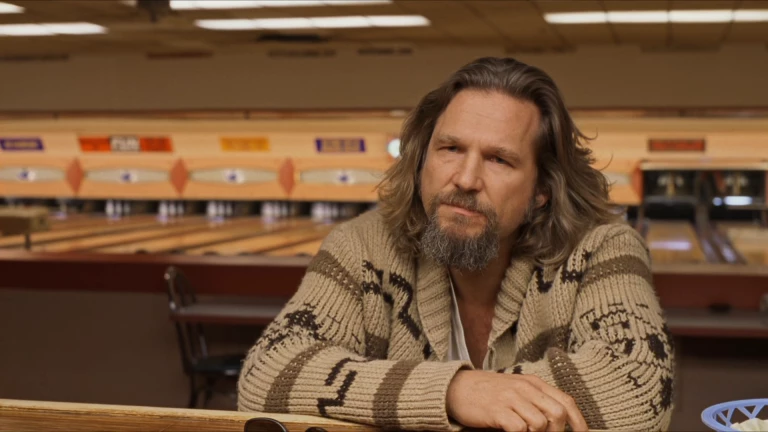Director: Joel Coen. Story and Screenplay: Joel Coen, Ethan Coen Photo: Roger Deakins. Editing: Joel Coen, Ethan Coen, Trisha Cooke. Artistic Director: Rick Heinrichs. Music: Carter Burwell. Cast: Jeff Bridges (Jeffrey “The Dude” Lebowski), John Goodman (Walter Sobchak), Steve Buscemi (Donnie), Julianne Moore (Maude Lebowski), David Huddleston (Jeffrey Lebowski), John Turturro (Jesus Quintana), Philip Seymour Hoffman (Brandt), Tara Reid (Bunny). Production: Ethan Cohen (working title). Duration: 118 minutes
Copy from Universal Pictures courtesy of Park Circus.
Restored in 4K in 2018 by Universal Pictures at NBCUniversal Studio Post.
Upon its release in the United States in 1998, The Big Lebowski did not receive the public response that the Oscars for screenplay and earnings from the previous Fargo might have predicted. However, in the following years, the film has developed into a true cult object filled with festivals and celebratory gatherings for fans to use and consume.
What are the causes of idolatry? The formal and narrative awareness and insight shown in the film. A laid-back mix of genres such as noir, musical, western, among which the comic and ironic register stands out. Cinematic allusions and quotes. Again, a fabulously surreal aspect, enriching the narrative with an appeal to dreams and the grotesque. The story itself is particularly complex: if the pretext for the comedy of misunderstandings with which the story begins is an exchange of people, when the beggar Dude is confused with the millionaire of the same name, then the main quest revolves around the kidnapping of Bunny, but the void and its assumptions turn out to be completely unfounded, despite skillfully distributed baits, hints and riddles. Add to that a gallery of hilarious and multifaceted characters, a range of quirky situations, a tone that oscillates between fiercely comic outbursts and fantasy forays, and a visual catalog of detail, slow motion, zenithal vantage points, masterful tracking. shots and eccentric scenes (the famous shot of a rolling bowling ball).
But the film’s real engine of success is Jeffrey “The Dude” Lebowski, a beacon of character in the dense web of doppelgangers and random acts that make up the story’s poetic universe. Lazy, lazy, carefree, Dude lives and lets live, involuntarily taking on the traits of Zen, allowing events to flow over him and enduring with stoic humility the series of events in which he becomes involved against his will. Dude is an outsider, an anachronistic figure who is aware of his own marginality and is able to declare this to the world. A symbol of the philosophy of life, which is perfectly embodied by the motto “Dude will abide” (“Dude will endure”).
Alice Autelitano
Just as “Just Blood” “comes” from “The Postman Always Rings Twice” and “Crossroads of Death” from “Lead and Blood”, so “The Big Lebowski” owes a lot to “The Big Sleep”: we wanted to capture the feel of the story. narrated as a modern version of Chandler; so the action takes place in Los Angeles. We wanted the narrative to unfold, a story that moves like a Raymond Chandler book through different parts of the city and through different social classes. This is the aspect that we are interested in when we are writing a script.
Joel and Ethan Coen

